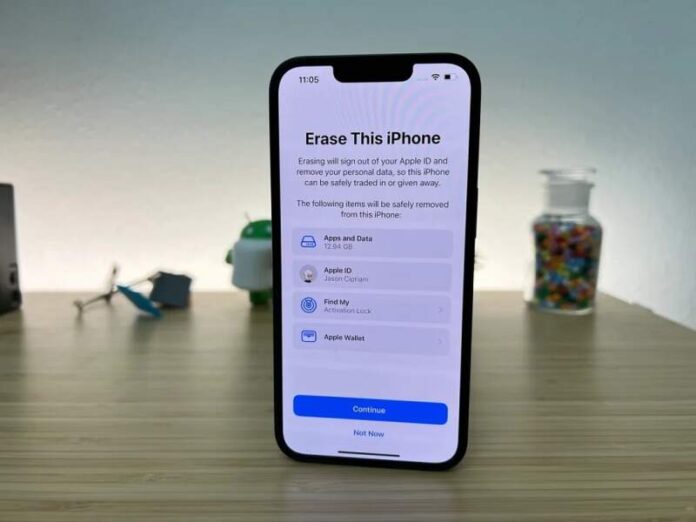Resetting an iPhone can be necessary for various reasons, such as resolving software issues, errors, bugs, or performance issues that may be affecting the device’s functionality. Sometimes, an iPhone may start to run slow, freeze, or crash frequently, and a reset can help to clear out any temporary files or settings that may be causing these problems.
Additionally, resetting an iPhone can also help to resolve issues with connectivity, such as Wi-Fi or cellular network problems. Furthermore, if you are planning to sell or give away your iPhone, a reset can be an essential step to remove all your personal data and settings from the device, ensuring the privacy of your data.
Overall, resetting an iPhone can be a useful troubleshooting step to resolve a wide range of issues and ensure that the device is running smoothly and efficiently. In this article we have mentioned all the steps on how to reset iPhone as well as their detailed instructions.
Steps to reset iPhone Without Losing Data
The process of reset iPhone without losing important data into the following categories:
- Backup: This is the most important step, as it ensures that you can restore your data after the reset. You can back up your iPhone’s data and settings by connecting it to your computer and using iTunes to create a backup. (or Finder on Macs running macOS Catalina or later)
- Reset: After creating a backup, you can proceed with resetting your iPhone. You can do this by clicking on the “Restore iPhone” button in iTunes (or Finder) and following the on-screen instructions. For iOS 11 or later, you can use the “Reset All Settings” feature to reset all of your iPhone’s settings to their factory defaults without erasing any of your data or media.
- Restore: After the reset process is complete, you can restore your iPhone from the backup you created earlier. This can be done by selecting the backup during the setup process and waiting for the restore process to complete.
Step 1: Backup
- Connect your iPhone to your computer using the lightning cable that came with your device.
- Open iTunes on your computer. (if you’re using a Mac running macOS Catalina or later, open Finder instead)
- Click on the iPhone icon that appears in the top left corner of the iTunes or Finder window.
- Click on the “Back Up Now” button to create a backup of your iPhone’s data and settings.
- Wait for the backup process to complete.
- This may take a few minutes to an hour depending on the amount of data you have.
- It’s important to note that if you’re using iCloud to backup your data, you can check the last time your iPhone was backed.
- You can do this by going to Settings > [Your Name] > iCloud > iCloud Backup.
- To create a backup, go to Settings then Your Name and then iCloud lastly iCloud Backup and turn on iCloud Backup.
Step 2: Reset
- After the backup process is complete, click on the “Restore iPhone” button in iTunes. (or Finder)
- A window will appear asking you to confirm, click on the “Restore” button.
- Follow the on-screen instructions to set up your iPhone as a new device.
- Wait for the reset process to complete. This could take a while depending on the amount of data you have on your device.
- Or if you want to use the “Reset All Settings” feature to reset all of your iPhone’s settings to their factory defaults without erasing any of your data or media:
- Go to Settings > General > Reset > Reset All Settings.
- Confirm by tapping reset All Settings.
Step 3: Restore
- After the reset process is complete. You will be prompted to restore your iPhone from a backup.
- Select the backup you just created, and wait for the restore process to complete.
- Wait for the restore process to complete.
- Once the restore process is done, all your important data and settings will be restored.
- You’ll be prompted to set up your iPhone.
- You can skip this process if you have restored the settings from the backup.
How to reset iPhone Settings without Losing Data
Now you know how to reset iPhone. You can also reset your iPhone’s settings which will not delete any of your personal data or media, such as photos, videos, or contacts. However, it will erase your Wi-Fi networks, Bluetooth connections, and VPN settings.
Also, it will remove all your customizations and preferences and you will need to configure them again. This can help you troubleshoot basic errors and issues. Here’s a step-by-step guide on how to reset your iPhone’s settings:
- Open the Settings app on your iPhone. This app is typically located on the home screen, and has a gear icon.
- Tap on General. This will bring up a list of settings related to your device’s overall functionality.
- Scroll down and tap on Reset.
- This will bring up a list of options for resetting different aspects of your iPhone’s settings.
- Tap on Reset All Settings.
- This will reset all of your iPhone’s settings to their default values, including your network settings, keyboard settings, and settings for apps and services.
- A pop-up window will appear asking you to confirm that you want to reset all settings.
- Tap on “Reset All Settings” to proceed.
- Your iPhone will now restart and all of your settings will be reset.
- This process may take a few minutes to complete, so be patient.
- Once your iPhone has restarted, you will need to enter your passcode and set up your device as if it was new.
It’s also important to remember that resetting your iPhone’s settings will not fix any hardware issues. If your iPhone is not working properly and resetting the settings does not help, you may need to contact Apple support or take your device to an authorized repair center.
Conclusion
There are various reasons why you should reset your iPhone as well as there are different approaches to do so. You can either reset your device by erasing everything or you can reset but exclude important data from erasing. In this article we have discussed all the steps need on how to reset iPhone as well as their instructions on how to do so.
Read Also: How To Transfer Data From iPhone To iPhone? A Detailed Guide




































































